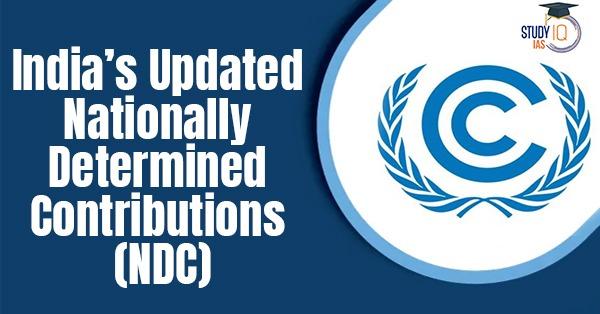Table of Contents
Nationally Determined Contributions: Background
- India had made the pledge during the Paris Climate Summit, 2015. The updated changes reflect India’s goal to reach net-zero emissions by 2070.
- During the Conference of the Parties (COP26) to the UNFCCC held in Glasgow, India expressed to intensify its climate action by presenting to the world five nectar elements (Panchamrit) of its actions.
- The updated Nationally Determined Contributions has been prepared after taking into consideration India’s national circumstances and the principle of common but differentiated responsibilities and respective capabilities (CBDR-RC).
- Paris Agreement 2015:
- The 2015 Paris Agreement is a legally binding international climate treaty, adopted by world leaders attending the Climate Conference, COP21.
- The treaty was adopted by 196 countries on December 12, 2015, and came into force on November 4, 2016.
- Goal: The main objective of the agreement is to keep average global temperatures “well below two, preferably to 1.5 degrees Celsius”, compared with pre-industrial levels.

Nationally Determined Contributions (NDC): About
- Nationally Determined Contributions (NDC) is a plan submitted by countries to work towards their climate goals.
- Signatories of Paris Climate Agreement must prepare, communicate, and maintain the Nationally Determined Contributions it intends to achieve as part of its climate action plan.
- Countries are required to submit Nationally Determined Contributions every five years to the UNFCCC secretariat.
Nationally Determined Contributions: India’s Pledges
- Emission intensity: Emissions intensity is defined as the total amount of emissions emitted for every unit of GDP.
- India has pledged to reduce the emissions intensity of the GDP by 45% by 2030, compared to the 2005 level. The goal to reduce emissions intensity and improve energy efficiency is not sector specific.
- Status: In 2020, India claimed to have already achieved 21% of its emissions intensity as a proportion of its GDP in line with its commitment.
- Share of non-fossil-based energy: India has planned to achieve about 50% of cumulative electric power installed capacity from non-fossil fuel-based energy resources by 2030.
- India plans to use low-cost international finance, including the Green Climate Fund (GCF), to achieve this objective.
- GCF: It was set up as part of the Paris Agreement to help developing countries achieve their Nationally Determined Contributions and work towards lowering emissions. It is the world’s largest climate fund.
- India plans to use low-cost international finance, including the Green Climate Fund (GCF), to achieve this objective.
- Sustainable living: India will promote sustainable living based on traditions, conservation, and moderation to combat climate change.
- LIFE: It has initiated a mass movement for “LIFE” – lifestyle for environment. LIFE is a public movement that encourages people to become pro-planet.
- Other pledges:
- Adopting a cleaner path for economic development
- Creating additional carbon sinks of 5 to 3 billion tonnes of CO2 equivalent through additional forest and tree cover.
- Adapting to climate change by improving investments in development programmes in vulnerable sectors
- Mobilizing funds from developed countries for implementing better mitigation and adaptation actions
- Building architectural framework for quick solution and better research and development for climate technologies
- Significance of Nationally Determined Contributions:
- Employment creation: The Nationally Determined Contributions will help in creation of green jobs such as in renewable energy, clean energy industries, Electric Vehicles and super-efficient appliances, and innovative technologies such as green hydrogen, etc.
- Sustainable growth: The Nationally Determined Contributions show India’s commitment at the highest level for decoupling economic growth from greenhouse gas emissions.
- Climate justice: It will implement climate justice to protect the poor and vulnerable from adverse impacts of climate change.

Nationally Determined Contributions: India’s Performance in Climate Goals
- Achievement of goals: India is the only G20 country that is on track to achieve its climate goals as pledged under the Paris Agreement.
- Climate change performance: India has been ranked among the top 10 countries in the climate change performance index in 2022.
- Its performance in greenhouse gas emissions, energy use, and climate policy categories is high, and is medium in the renewable energy category.





















 WhatsApp
WhatsApp